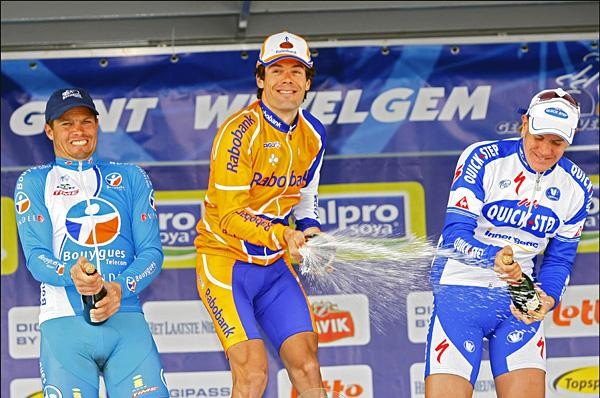Freire makes history
By Bjorn Haake in Wevelgem Oscar Freire was fully aware that thanks to his sprint win in...

By Bjorn Haake in Wevelgem
Oscar Freire was fully aware that thanks to his sprint win in Gent-Wevelgem, he made history by becoming the first Spaniard to put himself in the winner's list of the Belgian semi-classic. "It's great to be the first Spaniard to win here," said Freire after his win, which must have been on his mind since he came so close last year. That's when he made the winning five-man break, but got worked over by the T-Mobile duo of Marcus Burghardt and Roger Hammond.
Freire knew that the day for a Spaniard had to come sooner or later. "Flecha could have won it, if there wouldn't have been any motorbikes; seems it was the organisers' fault," said Freire, reminding everyone of how strong his compatriot and now-team-mate was in 2005, when Nico Mattan was able to catch up with Flecha in the final kilometre, thanks to using the slipstream of the motorbikes.
"I came close last year, too," he said of his quest to make history. "One time has to be the first." His directeur sportif, Erik Dekker, described the versatility of his captain by saying "last year he was in a break. You never know with Oscar. We have a good chance if there is a sprint and Oscar is there."
The Spaniard was quick to point out that it wasn't revenge that had driven him today. "No, no. I was in good shape. I realised towards the end that I had good legs, that the others were getting tired and it was my chance today; but it was difficult. There was a headwind in the last couple of kilometres. And [the race was] certainly different than last year." Freire felt more at home with a bunch sprint, rather than in a small group, where tactics can count out even the strongest rider.
Freire liked the fact that the sprint was not really controlled by any one team. The Spaniard had a simple explanation for the lack of a complete lead-out train. "There was just too much of a headwind." And with the peloton already cut in half at this point, control and team-mates were difficult to come by.
As for the different take of the Kemmelberg, Freire didn't think it changed the race much, but was happy with the alternate route. "I think it's easier, especially in bad weather. Now, the most complicated part is the uphill, so it's better for the riders." Because of the longer climb this year, the expected separation was accomplished and Freire said that "The second time up the Kemmelberg, there were less riders, but many from Rabobank."
Get The Leadout Newsletter
The latest race content, interviews, features, reviews and expert buying guides, direct to your inbox!
Other didn't like the scenario. "But we didn't get any help from other riders, so we waited and went easy," said Freire. This allowed the others to catch back on for a final bunch sprint, which Freire had expected anyway, due to the weather and the wind. The sun and calm at the end set up a good scenario for Freire. "We did the perfect race today," the Spaniard smiled. He was happy that the first part of the race was fast so some of the other sprinters were already tired.
Freire's goals this year include the Tour de France, the Olympics and, of course, the World Championships. But the next race he is shooting for is the Amstel Gold race, where he would like to have another shot at history, and at also becoming the first Spaniard to win the race. He is not afraid of the Cauberg. "The problem will be to arrive together [in a big group]. I have always sprinted well here, but never for first," he admitted under much laughter. But he feels that he has the upper hand on the other sprinters, who get tired.
He has already proven his uphill sprint qualities on the stage six of the 43rd Tirreno-Adriatico in March. And knowing the ambitious Spaniard, he may well become the first Castilian to win the Amstel Gold race. It would hardly come as a surprise.